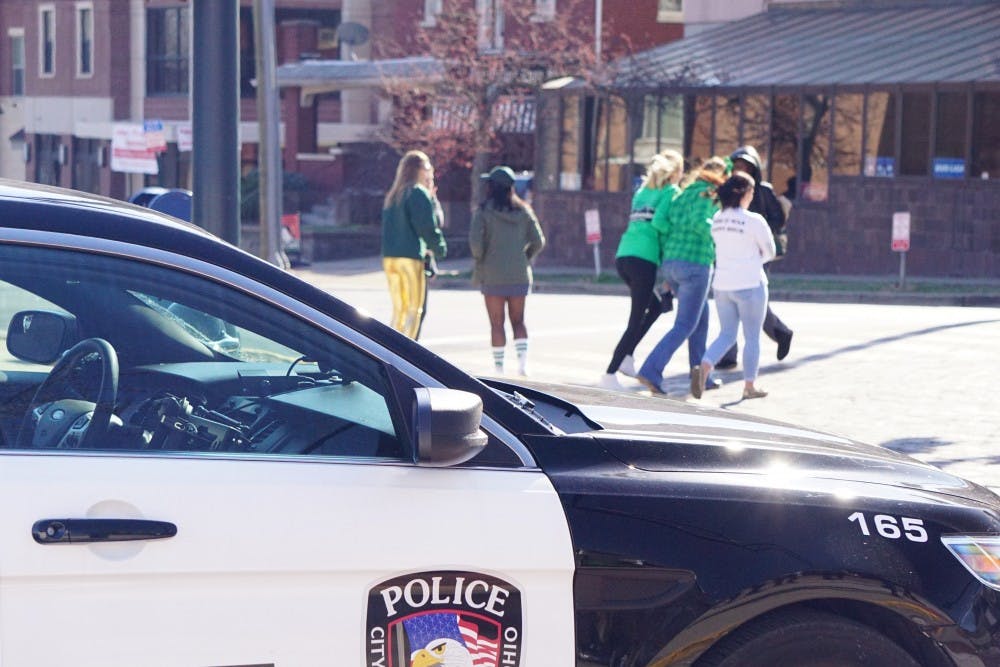Miami University students walked through the doors of the Oxford Municipal Court on a Thursday morning, shaking rain from their shoulders. Along with other Oxford community members, they filled the little lobby of the courthouse before filing into court.
The judge called off the names as students in khakis and button-downs filed up to the stand one-by-one. Every plea was the same: "guilty." Many were there for alcohol violations.
The Oxford Police Department (OPD) had 313 total arrests in 2016 for four common alcohol violations: open container, fake ID, underage possession/consumption and disorderly conduct, according to police records. That number has increased by 90 percent so far in 2017 to 596 arrests. OPD Lieutenant Laura Fening said the majority of those arrests are students.
Fening said the increase may be due to extra OPD patrols on Saturday afternoons, in collaboration with the Miami University Police Department on those patrols that started in spring semester 2017. The extra shifts happen mostly in August, September and October in the fall, and April and May in the spring, at the beginning and end of each school year.
"We feel it's important because of the townspeople that come in and the business owners that are bothered by the intoxicated people." Fening said. "We feel it's important for them to have a police presence around to make them not only feel safer but to deter and/or catch somebody doing something that they shouldn't be doing."
OPD has also hired seven new officers since 2012 to fill the spots left by retired officers, according to office manager Abby Gabbard."Those [new] officers tend to be more proactive rather than reactive," Fening said.
Fening said that when police are enforcing the law, they tend to focus on punishing the worst behavior first.
"I want them citing the person that is peeing in the doorway of the business rather than the litter violation where someone threw a can of beer down," Fening said.
While students have been drinking for years, Fening said has seen more students purposefully blacking out, especially as day drinking has become popular in recent years.
"I also went to school here," Fening said, "so I have seen 1989, and there has always been drinking and problems related directly from drinking."
Area I court judge Robert H. Lyons said he has noticed an increase in enforcement surrounding alcohol violations.
Once in court, many students go through a diversion program, a rehabilitation program for first-time offenders for misdemeanor crimes. Offenders complete certain tasks, such as an alcohol education course or community service, and if they do everything correctly, they avoid a conviction and their record will be sealed, Neaul Schuett, attorney at Rittgers and Rittgers, said.
"It's high risk, high reward," Schuett said. "If you mess up, you're convicted. If you don't, the prosecutor agrees to dismiss the case."
However, Lyons said those who go through the diversion will rarely fail the program or have a repeat offense.
Schuett said if a student's record is sealed, it will be unlikely to be an impediment when applying for jobs or graduate school. However, that doesn't mean someone applying for certain graduate schools or license programs would have to disclose they were cited or arrested to an ethical body.
Lyons said the increase in enforcement is good because it curbs student alcohol abuse.
"A student that gets charged with an underage alcohol offense, I think, learns from it," Lyons said. "The more they get caught, the more they get a lesson."
A Miami University senior learned his lesson when he was picked up by OPD last November, just five months before his 21st birthday. He jaywalked in front of a police car late on a Thursday night. When a plain-clothed police officer grabbed his arm, he became confrontational and would not cooperate with the police, resulting in not only a jaywalking charge but fake ID and underage possession/consumption charges.
Now a senior, the student said if he would have been sober, he probably would have made non-confrontational decisions that might not have resulted in the charges he faced. Sitting in the police station, he could only think of the repercussions of his actions.
He was confident in the lawyer's ability to seal his record, but the process of diversion and sanctions from Miami required extra work, and he paid $1,600 in legal fees. Overall, his arrest created a learning experience.
"Overall I would say it taught me a lesson," the senior said. "Sophomore year and the first half of junior year was a lot more wild than second semester junior year and so far this year."
fitzgelm@miamioh.edu

